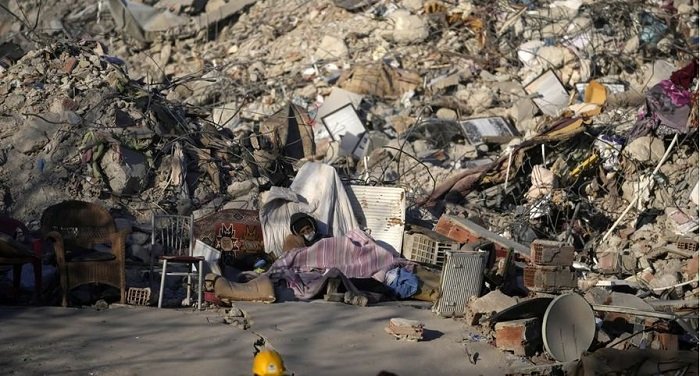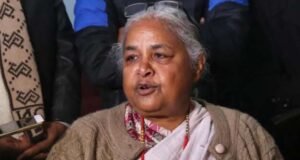
Among the rubble, hundreds of thousands of homeless people face cold and hunger as authorities in Turkey and Syria tackle the dire humanitarian disaster caused by the earthquake that has left more than 37,000 dead.
As hopes of finding people alive under the debris fade more than a week after the quake struck, the focus has switched to providing food and shelter to the vast numbers of survivors.
According to the Turkish government, about 1.2 million people have been housed in student residences, more than 206,000 tents have been erected and 400,000 victims evacuated from the devastated areas, reports AFP.
The disaster has also exacted a psychological toll. In a tent city near the quake’s epicentre in Kahramanmaras, father-of-four Serkan Tatoglu, 41, described how his family was haunted by their losses as they waited out the aftershocks.
“The youngest, traumatised by the aftershocks, keeps asking: ‘Dad, are we going to die?’” Tatoglu said of his six-year-old.
Turkey’s Vice-President Fuat Oktay said 574 children pulled from collapsed buildings were found without any surviving parents.
Only 76 had been returned to other family members.
One voluntary psychologist working in a children’s support centre in hard-hit Hatay province said numerous parents were frantically looking for missing kids.
“We receive a barrage of calls about missing children,” Hatice Goz said by phone.
“But if the child still cannot speak, the family is unable to find them.”
In the devastated Turkish city of Antakya, clean-up teams have been shifting rubble and putting up basic toilets as the telephone network started to come back in parts of the town.
The city was patrolled by police and soldiers deployed to prevent looting following several incidents over the weekend.
“Send any stuff you can because there are millions of people here and they all need to be fed,” Turkish Interior Minister Suleyman Soylu appealed late Sunday.
In Antakya and Kahramanmaras, food and other aid supplies were flowing in.
The economic cost of the disaster could be as much as US$84.1 billion, with nearly US$71 billion of that for housing, Turkish employers’ association Turkonfed said in a report Monday.
Neighbouring Syria, already racked by 12 years of civil war, is of particular concern.
The United Nations held an emergency meeting Monday on how to boost aid to rebel-held areas, as anger grows over a sluggish international response to the pariah nation.
Syrian President Bashar al-Assad, isolated and subject to Western sanctions, called for international assistance to help rebuild infrastructure in the country, where the UN estimates more than five million have been left homeless.
UN Secretary General Antonio Guterres said Assad has agreed to open two more border crossings from Turkey to northwest Syria to allow in aid.
Before the earthquake struck, almost all of the crucial humanitarian aid for the more than four million people living in rebel-controlled areas of northwest Syria was being delivered through just one crossing.
“Opening these crossing points – along with facilitating humanitarian access, accelerating visa approvals and easing travel between hubs – will allow more aid to go in, faster,” Guterres said.
More than a week after the 7.8-magnitude quake toppled buildings across the region, stories continue to emerge of people found alive in the rubble.
But experts warned that hopes of finding more survivors were dimming.
In Adiyaman province, rescuers reached 18-year-old Muhammed Cafer Cetin, and gave him an IV with fluids before attempting a dangerous extraction from a building that crumbled further as rescuers were working.
Medics surrounded him to place a neck brace and he was on a stretcher with an oxygen mask, making it out to daylight on the 199th hour. “We are so happy,” his uncle said.
Two others were rescued from one building that’s been destroyed in central Kahramanmaras, near the epicentre, Tuesday some 198 hours after the quake.
Broadcaster Haberturk said one was 17-year-old Muhammed Enes, who was seen wrapped in a thermal blanket and carried on a stretcher to an ambulance. Dozens of rescuers were working at the site and Turkish soldiers hugged and clapped after their rescue.
Rescuers then asked for quiet to continue looking for others and shouted “can anyone hear me?”
The health conditions of the rescued were unclear.
The Turkish toll now exceeds the 31,643 killed in a quake in 1939, the Disaster and Emergency Management Authority said on Monday, making it the worst quake in Turkey’s modern history.
The total death toll in Syria, a nation ravaged by more than a decade of civil war, has reached 5,714, including those who died in both the rebel enclave and government-held areas.
Trucks carrying shelter kits crossed from Turkey into northwest Syria on Monday.
However, UN officials said more was needed for the millions whose homes were destroyed.
On Monday, Sudan sent a flight carrying 30 tonnes of aid to Syria.
According to Syrian Transport Ministry official Suleiman Khalil, 62 planes carrying aid have so far landed in Syria and more are expected in the coming days, particularly from Saudi Arabia.
 Weekly Bangla Mirror | Bangla Mirror, Bangladeshi news in UK, bangla mirror news
Weekly Bangla Mirror | Bangla Mirror, Bangladeshi news in UK, bangla mirror news







